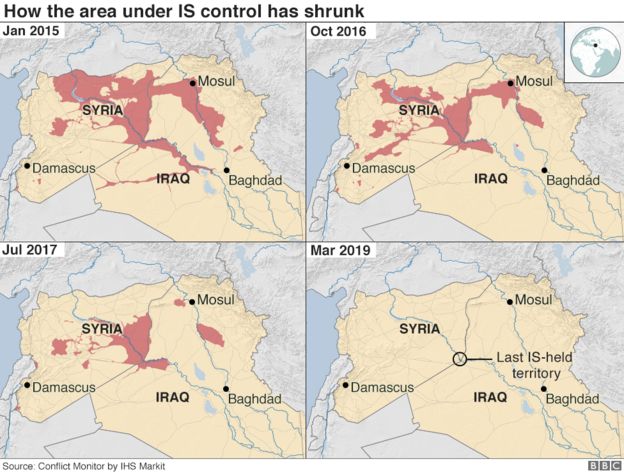
ISLAMIC STATE GROUP DEFEATED AS FINAL TERRITORY LOST, US-BACKED FORCES SAY
The US-backed Syrian Democratic Forces (SDF) says the Islamic State group's five-year "caliphate" is over after the militants were defeated in Syria.
SDF fighters have been raising victory flags in Baghuz, the last stronghold of the jihadist group.
At its height, IS controlled 88,000 sq km (34,000 sq miles) of land stretching across Syria and Iraq.
But despite the loss of of territory the group is still seen as a major global security threat.
- After the caliphate: Has IS been defeated?
- Islamic State women defiant in face of lost caliphate
- Tales from inside the chaos left by IS
IS retains a presence in the region and has affiliates in several other countries such as Nigeria, Yemen, Afghanistan and the Philippines.
How did the final battle unfold?
The Kurdish-led SDF alliance began its final assault on IS at the start of March, with the remaining militants holed up in the village of Baghuz in eastern Syria.
The alliance was forced to slow its offensive after it emerged that a large number of civilians were also there, sheltering in buildings, tents and tunnels.

Thousands of women and children, foreign nationals among them, fled the fighting and severe shortages to make their way to SDF-run camps for displaced persons.
Many IS fighters have also abandoned Baghuz, but those who stayed put up fierce resistance, deploying suicide bombers and car bombs.
"Syrian Democratic Forces declare total elimination of so-called caliphate and 100% territorial defeat of Isis [the IS group]," Mustafa Bali, the head of the SDF media office, tweeted.
"On this unique day, we commemorate thousands of martyrs whose efforts made the victory possible."
US President Donald Trump declared IS defeated late last year, announcing plans to withdraw US troops, a move that alarmed allies and prompted the resignation of senior officials. The White House has since said some US forces will remain in the region.
French President Emmanuel Macron welcomed the SDF's announcement, saying a "major danger for our country has been eliminated".
Why are there still concerns about IS?
IS grew out of al-Qaeda in Iraq in the aftermath of the US-led invasion of Iraq in 2003.
It joined the rebellion against Syrian President Bashar al-Assad in 2011. By 2014 it had seized swathes of land in both countries and proclaimed a "caliphate".
IS once imposed its rule on almost eight million people, and generated billions of dollars from oil, extortion, robbery and kidnapping, using its territory as a platform to launch foreign attacks.
The fall of Baghuz is a major moment in the campaign against IS. The Iraqi government declared victory against the militants in 2017.
But the group is far from defeated. US officials believe IS may have 15,000 to 20,000 armed adherents active in the region, many of them in sleeper cells, and that it will return to its insurgent roots while attempting to rebuild.
Even as its defeat in Baghuz was imminent, IS released a defiant audio recording purportedly from its spokesman Abu Hassan al-Muhajir, asserting that the caliphate was not finished.
The location of the group's overall leader, Abu Bakr al-Baghdadi, is not known. But he has avoided being captured or killed, despite having fewer places to hide.
SEE VIDEOS
